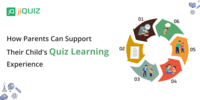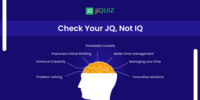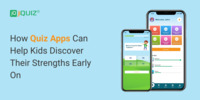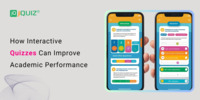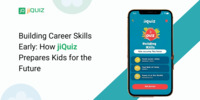- Jun 19, 2025
- Career & Skills
- 424
Share this post on:

We often think of learning as a passive activity – absorbing information from books, lectures, or online videos. But what if I told you that a seemingly simple activity like taking educational quizzes could be a powerful tool for strengthening your brain and building your self-belief? It's true! Beyond just assessing knowledge, quizzes, when used strategically, can be a dynamic learning experience. This blog post will dive deep into the science behind how quizzes work, the various benefits they offer, and how to use them effectively to unlock your full potential.
The Science Behind the Spark: Why Quizzes Work
The idea that quizzes are just for grading is outdated. Modern neuroscience provides compelling reasons why incorporating quizzes into the learning process can actually improve learning and retention. Here's a breakdown of the key concepts:
- The Testing Effect (Retrieval Practice): This is arguably the most significant factor. The testing effect, also known as retrieval practice, demonstrates that actively retrieving information from memory strengthens that memory trace. Simply re-reading material doesn’t provide the same cognitive workout. When you take a quiz, you’re forced to pull information from your brain, and that retrieval process creates a stronger and more durable memory. Think of it like exercising a muscle – the more you use it, the stronger it gets.
- Elaboration & Connection-Making: Quizzes often require you to apply concepts, not just recall facts. This forces you to elaborate on what you're learning and connect it to existing knowledge. These connections create a richer understanding and make the information more memorable. If a quiz question asks, "Explain how X affects Y," you're doing more than just regurgitating a definition; you're engaging in critical thinking.
- Metacognition – Knowing What You Know (and What You Don’t): Quizzes provide immediate feedback on your understanding. This allows you to identify areas where you're strong and, crucially, areas where you need to focus your efforts. This awareness of your own learning process, known as metacognition, is a vital skill for lifelong learning.
- Dopamine & Motivation: Getting a question right triggers the release of dopamine, a neurotransmitter associated with pleasure and reward. This positive reinforcement encourages you to continue learning and tackling challenges. Even incorrect answers can be motivating; they highlight areas for improvement.
Beyond Grades: The Multifaceted Benefits of Educational Quizzes
The benefits extend far beyond simply getting a good grade. Let's explore how quizzes contribute to overall cognitive development and personal growth:
- Improved Memory and Retention: As discussed, the testing effect is powerful. Repeated retrieval leads to better long-term memory.
- Enhanced Critical Thinking Skills: Quizzes often require you to analyze information, solve problems, and apply concepts – all essential components of critical thinking.
- Increased Self-Confidence: Successfully answering quiz questions, even challenging ones, reinforces your understanding and builds your belief in your abilities. This confidence can spill over into other areas of your life.
- Reduced Test Anxiety: Regularly engaging in low-stakes quizzes can desensitize you to the stress associated with high-stakes exams. The more familiar you are with the format and the process, the less anxiety you're likely to experience.
- Active Learning Engagement: Quizzes transform learning from a passive activity to an active one, boosting engagement and making the process more enjoyable.
- Personalized Learning: Adaptive quizzes, which adjust difficulty based on your performance, can create a truly personalized learning experience, catering to your specific needs and pace.
- Identification of Knowledge Gaps: Quizzes act as diagnostic tools, pinpointing areas where your understanding is weak or incomplete. This allows you to focus your study efforts effectively.
Types of Quizzes: A Spectrum of Learning Experiences
Not all quizzes are created equal. Different formats offer different benefits. Here's a look at common types and how they contribute to learning:
- Multiple Choice: Excellent for assessing recall and understanding of core concepts. They're relatively quick to complete and provide immediate feedback.
- True/False: Good for quick checks of understanding, but can be tricky as they require careful consideration of nuanced statements.
- Fill-in-the-Blanks: Forces active recall and challenges your ability to articulate information.
- Short Answer: Promotes deeper understanding and requires you to express your knowledge in your own words.
- Matching: Useful for connecting terms, definitions, or concepts.
- Case Studies/Scenario-Based Quizzes: Excellent for applying knowledge to real-world situations and developing problem-solving skills. These are particularly valuable in fields like medicine, business, and law.
- Adaptive Quizzes: These quizzes adjust the difficulty of questions based on your performance, ensuring that you're challenged but not overwhelmed.
- Gamified Quizzes: These quizzes incorporate game mechanics like points, badges, and leaderboards to make learning more engaging and fun.
Making Quizzes Work FOR You: Practical Tips & Strategies
Simply taking quizzes isn't enough. Here's how to maximize their benefits:
- Don’t Just Memorize – Understand: The goal isn’t to memorize answers; it’s to understand the underlying concepts. Use quizzes as a way to test your understanding, not just your ability to recall facts.
- Review Incorrect Answers Thoroughly: Don’t just brush aside incorrect answers. Take the time to understand why you got them wrong. Consult your notes, textbooks, or online resources to clarify the concepts.
- Use Quizzes as a Study Tool, Not Just an Assessment: Incorporate quizzes into your regular study routine. Don’t wait until the last minute to take them.
- Focus on the Process, Not Just the Score: The value of a quiz lies in the learning process, not just the final score. Don’t let a low score discourage you. View it as an opportunity to identify areas for improvement.
- Vary Quiz Formats: Challenge yourself with different quiz formats to engage different parts of your brain and reinforce learning in multiple ways.
- Seek Out Self-Graded Quizzes: Look for quizzes that provide immediate feedback, allowing you to identify and correct errors in real-time.
- Create Your Own Quizzes: Designing your own quizzes can be a powerful learning experience. It forces you to actively engage with the material and identify key concepts.
- Collaborate with Others: Discuss quiz questions and answers with classmates or study partners. Explaining concepts to others can solidify your own understanding.
- Embrace the Challenge: Don't shy away from challenging quizzes. They push you outside of your comfort zone and help you learn more effectively.
The Future of Quizzes: Adaptive Learning and Beyond
The landscape of educational quizzes is constantly evolving. Adaptive learning platforms are becoming increasingly sophisticated, providing truly personalized learning experiences. We’re also seeing a rise in immersive quizzes that incorporate virtual reality and augmented reality, making learning more engaging and interactive. AI-powered quizzes can provide even more detailed feedback and guidance, tailoring the learning experience to individual needs.
Conclusion: Unlock Your Potential with the Power of Quizzes
Educational quizzes are much more than just a tool for assessment. They’re powerful instruments for boosting brainpower, building confidence, and fostering a love of learning. By understanding the science behind the testing effect and embracing a strategic approach to quiz-taking, you can unlock your full potential and achieve your learning goals. So, next time you encounter a quiz, don’t see it as a test; see it as an opportunity to level up your mind!

